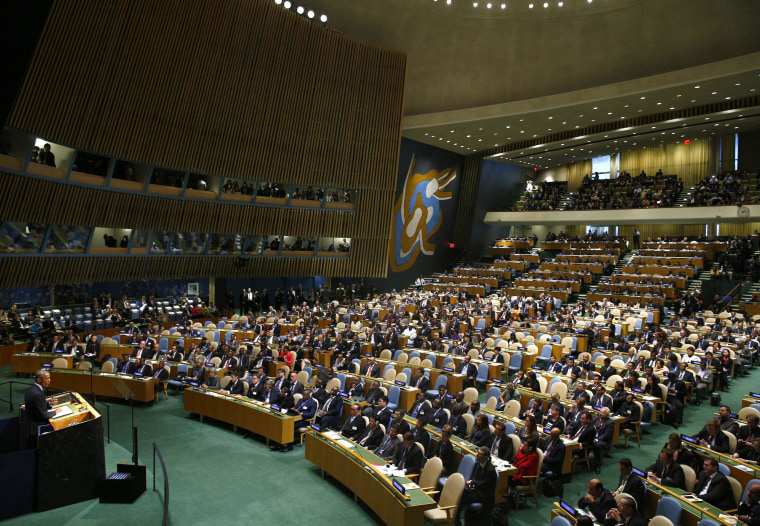It's a high-stakes day for President Barack Obama at the United Nations.
Less than 48 hours after American-led airstrikes hammered ISIS targets in Syria for the first time, Obama will address the General Assembly in New York, the largest diplomatic gathering in the world.
And in an extraordinary step later in the day, Obama will personally chair a Security Council meeting focused on the global threat posed by ISIS militants. It's only the second time a sitting U.S. president has done it. The first was Obama himself in 2009.
"The U.N. holds great symbolic value," said P.J. Crowley, a former assistant secretary of state and National Security Council adviser. "What's he's looking for is to build political legitimacy and sustainability for what we're undertaking in Syria and Iraq."
The U.S. says more than 40 countries have joined the anti-ISIS coalition, and five Arab states helped with the first round of bombing Tuesday. Analysts say Obama will use the U.N. to lay the groundwork for the next stage of the effort to stamp out the Sunni militants.
A larger coalition
The U.S. carried out its first airstrikes in Syria with the help of Bahrain, Qatar, Saudi Arabia, Jordan and the United Arab Emirates. But the White House is looking to add names to its list of allies.
"He doesn't want this to be another U.S. war," said Philip Seib, a professor of international relations at the University of Southern California and an expert on the Middle East.
Even statements of support from other world leaders would help the American cause, Crowley said, and they'll be listening closely to Obama.
“Here is where a lot of nations will be testing the political winds,” he said.
Obama has said he wants the U.S. to lead a broad coalition of countries "who have a stake in this fight."

Help from allies — and foes
Besides the five countries that helped with airstrikes on Tuesday, plus a handful of others, the commitments from U.S. allies have been vague. Even David Cameron, the prime minister of Britain, told NBC News that he hasn’t “ruled out” airstrikes.
Obama is looking for something concrete. The contributions don't have to be military: Countries can pledge financial help, humanitarian aid, border security, flyover rights and intelligence-sharing. Some of those commitments could be secured at face-to-face meetings away from the assembly hall.
Support from Sunni-majority countries, like Turkey and the Gulf states, can give the U.S. operation regional legitimacy — re-enforcing that the battle is between the civilized world and ISIS, not between the West and Sunni Islam.
Obama will watch to see how the new, Shiite-led government of Iraq presents itself, and whether it commits to giving Sunnis more of a voice. The previous prime minister, Nouri al-Maliki, alienated Sunnis — and some of them became more sympathetic to ISIS as a result.
As for China and Russia, a muted response is probably the best that Obama can hope for, Crowley said. Both are allies of Syrian leader Bashar Assad, whom the United States opposes. And China reflexively rebuffs foreign interference in any sovereign country’s affairs.
At a minimum, Obama hopes that countries “will refrain from throwing roadblocks along the path,” Crowley said. “He’s looking for as much support as he can get.”
Tough action on foreign fighters
Analysts have estimated that ISIS has at least 10,000 foreign-born fighters, including many flowing in and out of Syria and Iraq. The largest cohort of these aspiring jihadists comes from nearby Muslim nations, but smaller blocs come from nations as far away as China, Russia and even the United States.
Obama is expected to address the threat of foreign fighters when he presides over the Security Council meeting Wednesday. The White House hopes the body will pass a binding resolution that will compel countries to prosecute citizens who go to the Middle East to join ISIS and curb the flow of would-be fighters through their regions, Seib said.